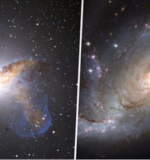Astronomers have found a distant galaxy without any dark matter.

Yale University astronomer, Pieter van Dokkum, analysed a sprawling, old galaxy, with a few stars speeding around with no detectable influence from dark matter, according to a study published in Nature, report the Independent.
Yet scientists believe this might further prove the existence of dark matter.

For those of you not in the know when it comes to dark matter, allow me to pass things over to NASA:
We are much more certain what dark matter is not than we are what it is. First, it is dark, meaning that it is not in the form of stars and planets that we see. Observations show that there is far too little visible matter in the universe to make up the 27% required by the observations
Second, it is not in the form of dark clouds of normal matter, matter made up of particles called baryons. We know this because we would be able to detect baryonic clouds by their absorption of radiation passing through them. Third, dark matter is not antimatter, because we do not see the unique gamma rays that are produced when antimatter annihilates with matter.
NASA add:
Finally, we can rule out large galaxy-sized black holes on the basis of how many gravitational lenses we see.
High concentrations of matter bend light passing near them from objects further away, but we do not see enough lensing events to suggest that such objects to make up the required 25 per cent dark matter contribution.
Case Western Reserve astronomer Stacy McGaugh said:
Not sure what to make of it, but is definitely intriguing. This is a weird galaxy.

Van Dokkum studies vast galaxies which boast very few stars. He looks for them by building makeshift telescopes out of 48 telephoto lenses.
One of them, Dragonfly, is located in New Mexico. Dokkum used the telescope to find the galaxy NGC1052-DF2 in the northern constellation, Cetus AKA, the whale.
According to The Guardian, he said:
This whole story is one of dark matter being the scaffolding on which every galaxy is built.
It’s not just a component of a galaxy, like a spiral arm, it’s more like the fundamental skeleton that underlies all the structure in the universe.

Professor Jeremiah Ostriker, a professor of astronomy at Columbia University in New York, called the observation ‘highly significant’, saying:
The standard paradigm has gas falling into halos – or lumps – of dark matter and turning into stars to make a galaxy.
This one was clearly made some other way.
Dokkum says there’s no good explanation as to why this galaxy is without dark matter, but proposed a few possibilities – one of which, his favourite, was that the galaxy formed in ‘a way astronomers have never seen or understood.’








 Photographer Finds Locations Of 1960s Postcards To See How They Look Today, And The Difference Is Unbelievable
Photographer Finds Locations Of 1960s Postcards To See How They Look Today, And The Difference Is Unbelievable  Hij zet 3 IKEA kastjes tegen elkaar aan en maakt dit voor zijn vrouw…Wat een gaaf resultaat!!
Hij zet 3 IKEA kastjes tegen elkaar aan en maakt dit voor zijn vrouw…Wat een gaaf resultaat!!  Scientists Discover 512-Year-Old Shark, Which Would Be The Oldest Living Vertebrate On The Planet
Scientists Discover 512-Year-Old Shark, Which Would Be The Oldest Living Vertebrate On The Planet  Hus til salg er kun 22 kvadratmeter – men vent til du ser det indvendigt
Hus til salg er kun 22 kvadratmeter – men vent til du ser det indvendigt  Nearly Frozen Waves Captured On Camera By Nantucket Photographer
Nearly Frozen Waves Captured On Camera By Nantucket Photographer  It’s Official: Astronomers Have Discovered another Earth
It’s Official: Astronomers Have Discovered another Earth  Meteorite That Recently Fell in Somalia Turns Out to Contain Two Minerals Never Before Seen on Earth
Meteorite That Recently Fell in Somalia Turns Out to Contain Two Minerals Never Before Seen on Earth  Superknepet – så blir snuskiga ugnsformen som ny igen!
Superknepet – så blir snuskiga ugnsformen som ny igen! 
xvpekd